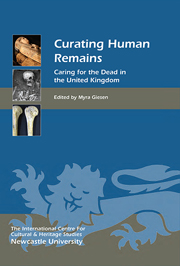Book contents
- Frontmatter
- Contents
- List of Illustrations
- Acknowledgments
- List of abbreviations
- Introduction: Human Remains Curation in the United Kingdom
- 1 International Perspectives towards Human Remains Curation
- 2 Dealings with the Dead: A Personal Consideration of the Ongoing Human Remains Debate
- 3 Care, Custody and Display of Human Remains: Legal and Ethical Obligations
- 4 The Impact and Effectiveness of the Human Tissue Act 2004 and the Guidance for the Care of Human Remains in Museums in England
- 5 Dead and Forgotten? Some Observations on Human Remains Documentation in the UK
- 6 Tethering Time and Tide? Human Remains Guidance and Legislation for Scottish Museums
- 7 The Quick and the Deid: A Scottish Perspective on Caring for Human Remains at the Perth Museum and Art Gallery
- 8 The Museum of London: An Overview of Policies and Practice
- 9 Curating Human Remains in a Regional Museum: Policy and Practice at the Great North Museum: Hancock
- 10 Curation of Human Remains at St Peter's Church, Barton-upon-Humber, England
- 11 Archaeological Human Remains and Laboratories: Attaining Acceptable Standards for Curating Skeletal Remains for Teaching and Research
- 12 ‘No Room at the Inn’ … Contract Archaeology and the Storage of Human Remains
- 13 Changes in Policy for Excavating Human Remains in England and Wales
- 14 Conclusions and Ways Forward
- Appendix 1 DCMS Guidance for the Care of Human Remains in Museums: Contents page and Part 2
- Appendix 2 MGS Guidelines for the Care of Human Remains in Scottish Museum Collections: Contents page and Chapter 2
- List of Contributors
- Index
- Miscellaneous Endmatter
2 - Dealings with the Dead: A Personal Consideration of the Ongoing Human Remains Debate
Published online by Cambridge University Press: 05 May 2013
- Frontmatter
- Contents
- List of Illustrations
- Acknowledgments
- List of abbreviations
- Introduction: Human Remains Curation in the United Kingdom
- 1 International Perspectives towards Human Remains Curation
- 2 Dealings with the Dead: A Personal Consideration of the Ongoing Human Remains Debate
- 3 Care, Custody and Display of Human Remains: Legal and Ethical Obligations
- 4 The Impact and Effectiveness of the Human Tissue Act 2004 and the Guidance for the Care of Human Remains in Museums in England
- 5 Dead and Forgotten? Some Observations on Human Remains Documentation in the UK
- 6 Tethering Time and Tide? Human Remains Guidance and Legislation for Scottish Museums
- 7 The Quick and the Deid: A Scottish Perspective on Caring for Human Remains at the Perth Museum and Art Gallery
- 8 The Museum of London: An Overview of Policies and Practice
- 9 Curating Human Remains in a Regional Museum: Policy and Practice at the Great North Museum: Hancock
- 10 Curation of Human Remains at St Peter's Church, Barton-upon-Humber, England
- 11 Archaeological Human Remains and Laboratories: Attaining Acceptable Standards for Curating Skeletal Remains for Teaching and Research
- 12 ‘No Room at the Inn’ … Contract Archaeology and the Storage of Human Remains
- 13 Changes in Policy for Excavating Human Remains in England and Wales
- 14 Conclusions and Ways Forward
- Appendix 1 DCMS Guidance for the Care of Human Remains in Museums: Contents page and Part 2
- Appendix 2 MGS Guidelines for the Care of Human Remains in Scottish Museum Collections: Contents page and Chapter 2
- List of Contributors
- Index
- Miscellaneous Endmatter
Summary
As a ten-year-old child, I was scared of an Andean mummy displayed in my local museum (the Horniman in South East London). I did not ponder its humanity, the ethics of displaying it or the rights of those who might wish to reclaim it. I was just scared of it. I am not scared of human remains any more. Over many years of working in close proximity with skeletons I have never sensed that I was in the presence of something inherently sacred or holding some residue of the living. I do not believe in ghosts. However, I did have an emotional and humbling experience the first (and only) time I was allowed to hold the skull of an unidentified aboriginal Australian. The experience was partly prompted by science – the skull was recognisably different from the European skulls I was used to – and partly through association. At the time, I was nearing the end of some work for the UK Government and I had spent time studying the Aboriginal experience. I knew how those people had suffered and I knew the symbolic and sacred importance of the skull in my hand, not only to Aboriginal Australians but also to the scientific community. This was indeed a sacred object, but ironically, the sacredness I bestowed upon it came from a set of Western values – an understanding of science and history, and a wish to empathise. A lot has happened since then in terms of archaeological practice and policy with regards to human remains.
- Type
- Chapter
- Information
- Curating Human RemainsCaring for the Dead in the United Kingdom, pp. 25 - 30Publisher: Boydell & BrewerPrint publication year: 2013



